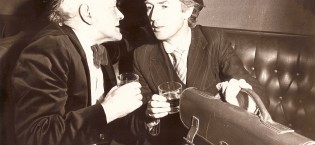Sligo Drama Circle in “Montserrat”
 Is treachery praiseworthy? If good results from treason, is it to be admired? These are questions which may be asked after seeing Sligo Drama Circle’s presentation of Lillian Hellman’s adaptation of Emmanuel Robles’ “Montserrat”. To most, treachery is despicable. The betrayed abhor the betrayer, no matter what his motives, and his memory is disdained. Those who benefit by the betrayal let the advantageous results to themselves obscure the means by which these results came, and consider the treason but a small link in their chain of destiny. Yet, in this play of treachery and conflict, treason, and a traitor in the person of Montserrat, have our admiration and sympathy. The traitor is the hero and we are on his side.
Is treachery praiseworthy? If good results from treason, is it to be admired? These are questions which may be asked after seeing Sligo Drama Circle’s presentation of Lillian Hellman’s adaptation of Emmanuel Robles’ “Montserrat”. To most, treachery is despicable. The betrayed abhor the betrayer, no matter what his motives, and his memory is disdained. Those who benefit by the betrayal let the advantageous results to themselves obscure the means by which these results came, and consider the treason but a small link in their chain of destiny. Yet, in this play of treachery and conflict, treason, and a traitor in the person of Montserrat, have our admiration and sympathy. The traitor is the hero and we are on his side.
Sligo Drama Circle’s production of this exacting play was effectively staged and adequately produced. Firmer direction in the opening scene would have got the play off to a better start and created a more vivid atmosphere of the tension which hung over the officers and soldiers of the Spanish army. With the entrance of Montserrat this feeling of tension was established and the play sprang to life and continued to grow in strength till the end. More attention could have been given to the lighting. One of the characters (Matilde) remarks in Act 1 that the sun is already going down. Yet at the end of Act 2, almost two hours later, the lighting is unchanged. If the music, with which the unseen, eccentric Governor entertained himself, was considered by the producers to be essential to the production and to the dramatic effect of the play, it should have been audible enough for the audience to distinguish or else omitted altogether and merely suggested. The woolly sounds, obviously from gramophone records, which aimed at suggesting music at a distance, did nothing to heighten the sense of drama.
The acting was a triumph for the principals. They acted well and spoke well, conveying a sincerity that made the audience believe in each of them. Their acting was convincing and eloquent in its ferocity or in its restraint. With the exception of the women, they were an unlovable lot of characters – even Montserrat, the hero, was a traitor – but each actor succeeded in gaining sympathy, or derision, for the character he portrayed. T.P. Hayes, as Montserrat, was splendid. He showed great stage presence and his restrained, minor-key approach to the role left him some wonderful opportunities for showing deep feeling and complete conviction in the part. As Izquierdo, Eddie Mc Dermottroe gave what is probably the best performance of his acting career. The character is a formidable and inhuman one, but the actor conveyed that aristocratic and urbane manner Spanish aristocrats are credited with. His (Izquierdo’s) conflict, while not so great as Montserrat’s, was a terrible one, and this was well brought out in the acting. It was a pity the make-up made him look oriental – Spain did not own the Philippians at the time, of course!
Poor, poor Salcedo! What a marvellous job Walter Mc Donagh made of his part which could have so easily lent itself to over-acting. His scene, when forced by his torturer to play his favourite part from a play, was one of the highlights of the entire performance. For the second year in succession Paddy Dooney (Salas Ina) had the part of a gombeen man, this time the Spanish-American variety, and to all appearances a more hateful type than the home product. He played the part with such a sickly oiliness, that thought we may have pitied the character he portrayed, we were not sorry he was the first to be shot. A very fine piece of work, indeed, this was. All it needed was a little more shading to make it almost perfect.
The women were excellent, Monica Toher, as Felisa, with so little to say, and yet such a vital part to play in the action of the drama, brought to this characterisation a forcefulness that was acute. Matilde who found herself in a situation entirely beyond her comprehension, was beautifully portrayed by Marie Mulvihill, who conveyed the stunned amazement of this poor woman admirably. Brian Bohan gave an adequate performance as Luhan. The other members of the cast were necessary to the unfolding of the play, but their contributions to the acting are best passes over in charitable silence. The contrast between their work and that of the principals made the play, well produced though it was, uneven and not entirely satisfying.
Thinking of this play and its real hero, Bolivar, one is inclined to the opinion that had he been captured, and the liberation of Spanish-America delayed some fifty or sixty years, these countries would have been happier. The Spanish yoke – that easy, stupid, backward, indifferent, intolerant yoke – was thrown off and the people persecuted by their own with greater ferocity than Spain ever knew.
from The Sligo Champion, by Frank Calder, March 5th, 1960
Tags: History, Lillian Hellman, Press Reports, Productions, Reviews








